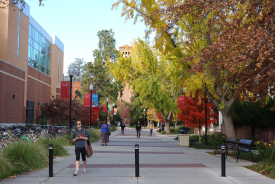UC Files Appeal For CRISPR Patent Ruling To Reinstate Interference For Technology [Video]
ByThe University of California - Berkeley has filed an appeal for the Patent Trial and Appeal Board (PTAB) ruling involving the CRISPR patent. The decision favored the Broad Institute, a research affiliate of Harvard University and the Massachusetts Institute of Technology.
Earlier this year, it was reported that three judges from the PTAB ruled that patents on the CRISPR-Cas9 gene-editing technology belong to the Broad Institute of Harvard University and MIT. UC Berkeley filed a patent in May 2012 for ownership of the technology including ownership of its uses in all types of cells.
UC Berkeley's Jennifer Doudna and Emmanuelle Charpentier, who was with the University of Vienna at the time, described a simple gene-editing system for the precise cutting of DNA in a test tube in their paper which was published in 2012. In Jan. 2013, Broad Institute researcher Feng Zhang used the gene-editing technique within living cells.
The UC Berkeley research team argued that what Zhang did was only a refinement of their original work. The university believes that it should own the IP rights to the CRISPR technology because their research team was the one who invented the system.
This time, UC Berkeley has filed an appeal, seeking a reversal of the decision. Reuters reported that the ruling was done before identifying who first invented the use of CRISPR in eukaryotic cells.
In a press release on its official website, UC Berkeley clarified that the appeal was to overturn a decision to terminate the interference between a UC patent application for CRISPR-Cas9 gene-editing technology and the patent applications and issued patents of the Broad Institute. An interference is a legal proceeding to identify who was the first to invent a certain technology.
Broad Institute has stated its confidence that the appeals court will affirm the ruling and "recognize the contribution of the Broad, MIT and Harvard in developing this transformative technology."
UC Berkeley has already won a patent in the United Kingdom. Back in March, the European Patent Office announced its "intention to grant a patent" to the public institution. It has favored the UC argument that its findings cover CRISPR use in both prokaryotic and eukaryotic systems.
© 2025 University Herald, All rights reserved. Do not reproduce without permission.








